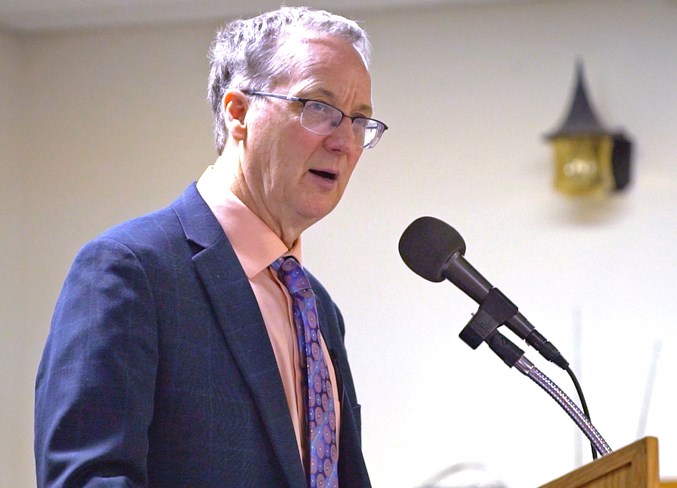A person should never be told to “just get over” the loss of a loved one.
Rather, people should be encouraged to find ways to honour the memories of those who were important to them, says Rick Bergh, an author with a background in counselling and thanatology, who recently presented a workshop called Creating a Loss-friendly Community at the Sundre Royal Canadian Legion Branch #223
Hosted by the Sundre Palliative Care Association on Monday, March 11, the daylong session was attended by nearly 80 people.
Bergh, who also did a similar presentation last year, said his goal was to provide people with the tools they need and empower them to be better prepared to help a friend or family member navigate through the difficult period following the death of someone close.
He stressed the importance of being a friend rather than a counsellor.
“Sometimes, people just need a friend to come alongside during the transition,” he said.
With the exception of traumatic grief, “we just need people to engage with us in a healthy way.”
Small towns such as Sundre can become loss-friendly communities much easier than larger municipal centres since there is generally already an existing sense of love, connection and shared history that is scarcer in the city where neighbours are less likely to know one another, he said.
“I really believe that normal everyday people, especially in a rural setting, have a distinct advantage.”
Those who attended the workshop were excited to learn a few tips in terms of how to help others cope with grief, he said.
“The whole point of the workshop was to help Sundre, the community, to become a loss-friendly community.”
That can be accomplished through establishing a common language and learning how to engage and have a meaningful conversation with an individual who is grieving, he said. People should not be reluctant or scared to approach someone who could use a friendly shoulder to lean to on, he added.
“Some people might be afraid of saying something wrong,” he said.
“A lot of people don’t want to talk about the person who died, because they think they’ll make a grieving person sad.”
However, people who have experienced loss often want to talk about their loved ones, he said.
Whether at the grocery store, hockey arena or basically anywhere in between, Bergh suggests approaching such conversations by asking the person what he or she misses about the deceased and what was important about them.
The workshop included a role-playing portion to provide people an opportunity to practise engaging in such conversations, he said.
Trained as a narrative therapist, Bergh said “it’s all about the story.”
One participant volunteered the story about the loss of her husband and why he was so special to her, and the group discussed ways to honour his memory while helping her discover a new way forward.
Some people who attended also told Bergh it was the first time they had not been told to “just move on.”
The kind of language people should avoid using when helping someone who is grieving are words such as closure, he said, adding that the fives stages of grief and telling someone to move on with life are also often mentioned.
“As though grief somehow has an ending,” he said.
Repressing emotions is unhealthy, and the best way to deal with grief is by integrating the memory of the lost loved one into daily life, he said.
“The grief will return, the missing won’t stop. You’re always going to miss that person at different times, and that’s OK, because you love them.”
He said the brain evolved to store memories that simply will not disappear following the death of someone close. So it is just a matter of time before feelings eventually resurface, typically triggered by any number of stimuli such as a specific smell, touch or sight, he said.
“Our senses are bringing those memories back to life.”
But a flood of resurgent memories is not necessarily a bad thing, he said, and a person should honour what comes back by recollecting the story of their loved one, which will leave that individual in a better position to be able to get through the day.
“It’s a gift that you remember.”
When asked what the main point those who attended took away from his presentation should be, Bergh said, “I would hope that people would have some confidence to engage people who are grieving without worrying that what they say will not be helpful.”
Bergh — who eventually remarried following the loss of his first wife who died of cancer — said he is passionate about passing along constructive advice to help people expand on the next chapter in life, and is motivated to enable others to develop the skills needed to engage.
“That’s what excites me to do my work.”



